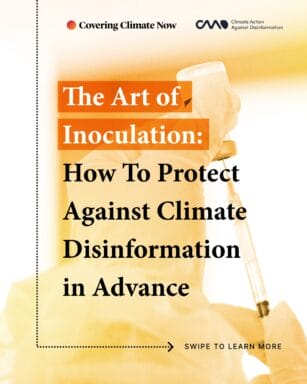Sign up for Climate on the Ballot, our weekly newsletter with ideas for reporting on climate and the 2024 elections.
Our species has been observing the sun, the moon, and the stars for all of our history. Doing so has brought order to our understanding of the world and inspired collective awe for millennia. Monday’s solar eclipse across North America, which drew tens of millions of people outside in a rare moment of unity and reverence for something so much larger than us, was no exception.
The eclipse comes at a time when the consequences of human-caused climate change are becoming more evident every day, demanding our sharpest attention, a sense of what’s collectively possible, and an understanding of the work ahead.
“This is a good opportunity for people to reflect on the fact that we live on a very fragile and beautiful rock in space, the only place we know in the cosmos to support life,” climate scientist Peter Kalmus told Amy Goodman on Monday.
In 1968, NASA astronauts aboard Apollo 8 took the first color photo of Earth seen from space. For the first time, humans were able to look back on ourselves, our collective home, and see how small we really were. Less than two years later, some 20 million people — around 10% of the US population at the time — turned out on the streets for demonstrations on the first Earth Day. Advocates have connected this movement to the new perspective on our world that the Apollo 8 photo inspired.
“We set out to explore the moon and instead discovered the Earth,” astronaut Bill Anders, who took the iconic photo, wrote in an op-ed celebrating its 50th anniversary.
This week, millions of people in North America traveled to the path of totality, while tens of millions more left their homes and offices on Monday to stare at the sky. Internet usage during the eclipse dropped by as much as 60% in some areas.
For journalists, the eclipse is a reminder that audiences still respond to the basic astonishment of nature. Climate is a political story, an economic story, a cultural story — but it is also a story calling us to come together to preserve the only home we’ve ever known.
From Us
New! US elections reporting guide. Hot off the presses, our brand new guide to covering climate change and the 2024 elections. See the guide.
New! Climate-first voters. An increasing number of potential voters in the US say climate is their number one issue, but they vote at lower than average rates. This week’s Climate on the Ballot has story ideas on how to cover this trend. Learn more.
New! CCNow Q&A. CCNow recently talked to Jessica Kutz, The 19th’s gender, climate, and sustainability reporter. She spoke about how she finds stories to cover, gender-based oversights in disaster planning and responses, and how climate action can help rectify historical inequities. Read it at Columbia Journalism Review.
Climate & elections calendar. Sign up for CCNow’s new calendar that tracks key election dates, climate events, and more. Take me there.
Noteworthy Stories
Seaweed invasion. Global and local leaders haven’t taken sufficient action to curb the explosive growth of Sargassum seaweed in the Caribbean, which is linked to global pollution and climate change. Massive blooms, which have become common since 2011, led to power outages, health problems, economic loss, and more in 2023. By Freeman Rogers, Olivia Losbar, Maria Mónica Monsalve, Krista Campbell, and Suzanne Carlson at the Guardian…
Human rights. Switzerland is violating its citizens’ human rights by insufficiently reducing carbon emissions, according to a European Court of Human Rights ruling. The case, brought by a group of Swiss elderly women, could bolster other pending human-rights based climate lawsuits. By Deutsche Welle…
- A Supreme Court ruling in India found that people there have the “right against the adverse effects of climate change.”
Tipping points. Scientists warn that several Earth systems are nearing tipping points, critical thresholds that could lead to irreversible changes. These include coral bleaching, Arctic winter sea ice melt, and more, explained by the Daily Maverick…
“Quantum leap.” Ahead of a World Bank meeting next week, the UN climate chief, Simon Stiell, called for a major overhaul of its climate funding practices to stave off a global “climate-driven economic catastrophe.” He called for a “quantum leap in climate finance this year” and said urgent climate action is needed over the next two years. By Seth Borenstein and Jamey Keaten at the Associated Press…
Reviving traditions. Climate change is threatening the food and water sources that Native American communities rely on for sustenance. Some communities are turning to traditional gardening practices to grow crops that have a variety of economic, cultural, and medicinal benefits. By Adam Kemp at PBS NewsHour…
Resources
US lobbying. A new database produced by Brown University’s Climate and Development Lab allows users to explore how various interest groups lobby in 17 US states and visualize relationships between those groups.
Methane plumes. Global Investigative Journalism Network provides an overview with new tools for reporting on methane emissions.
33 false claims. The Sabin Center for Climate Change Law identifies and explains 33 common false claims about solar energy, wind energy, and electric vehicles, and how to rebut them.
Youth & news. To effectively engage with younger audiences, newsrooms should adopt a business mindset and view their coverage as a product to be marketed, says Hannah Ajakaiye, head of FactsMatterNG. She suggests several strategies for enhancing interaction with young people.
Climate elections. The Society of Environmental Journalists’ annual conference opening plenary “Election 2024: How Will Climate Change Matter?” is available for viewing.
Events
New England reporters. The New England First Amendment Coalition will hold a 30-minute training session on climate reporting for beat reporters. April 16. RSVP.
African heatwave and drought. World Weather Attribution will hold a press briefing on the influence of climate change and El Niño on recent extreme weather events in Africa. Reporters can contact wwamedia@imperial.ac.uk for embargoed materials. April 17. RSVP.
Climate adaptation. The Pulitzer Center is holding a webinar, “On Thin Ice: Covering Climate Adaptation in a Rapidly Changing World.” April 23. RSVP.
Democracy. The Wilson Center’s webinar, “Environmental Journalists on the Frontlines of Democracy,” will examine the “important role of environmental journalism and highlight the need to protect journalists around the world from surveillance, censorship, oppression, and violence.” May 1. RSVP.
Press freedom. UNESCO will hold the World Press Freedom Day Conference, “A Press for the Planet: Journalism in the face of the Environmental Crisis” in Santiago, Chile, May 2-4. Plenary sessions will be broadcasted online. Learn more.
Via Social
Can you arm your readers with the truth and preempt climate disinformation before they hear it from others? Yes! Check out CCNow’s new Instagram carousel, produced with Climate Action Against Disinformation and Drilled, for more. See this story by CBS News as an example.
Industry News
Misinformation. CBS News plans to bring its CBS News Confirmed unit, which focuses on helping viewers manage misinformation, to its audiences on television, digital, and social media.
Jobs, Etc.
Jobs. Agence France-Presse is looking for a Spanish-language journalist with fact-checking experience for its offices in either Barcelona or Madrid, Spain. Code for Africa is looking for an English-language copy editor based in an African country. DeSmog is recruiting an interim editor (remote, North America). Mongabay is hiring a wire reporter (remote) and a staff writer based in West or Central Africa.
“Dirty disinfo smackdown.” Yellow Dot Studios is sponsoring a contest for the best posts, memes, and videos calling out fossil fuel disinformation. Apply by April 12.
Fellowships. Climate Tracker is accepting applications from journalists across the Caribbean for its Caribbean Climate Justice Journalism Fellowship. Apply by April 22. The Sharon Begley Science Reporting Fellowship is open for early-career US journalists from underrepresented groups. Apply by April 26.
Climate video project. In Old News, in partnership with Internews’ Earth Journalism Network and The Swedish International Development Cooperation Agency, is looking for journalists interested in filming short video clips for a free climate change video library. Apply by April 30.
Film contest. Yale Environment 360 is accepting entries for the annual Yale Environment 360 Film Contest. Enter by May 20.

